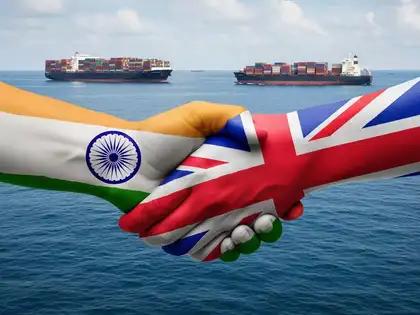 Image Source: Economic Times
Image Source: Economic Times
Key Highlights
The India-UK Free Trade Agreement, signed July 24 in London, includes a ground-breaking safeguard clause empowering India to temporarily raise tariffs or withdraw tariff concessions if British imports surge and harm domestic industries
These measures provide a vital safety net for Indian businesses, ensuring market-opening benefits do not undermine sensitive domestic sectors such as textiles, footwear, dairy, and rice
The safeguard system is rigorous, structured, and enforceable, with defined triggers, review periods, and built-in checks to balance protection with openness
A New Chapter in Indo-British Trade Relations
After years of talks, India and the UK have formalized a major trade pact poised to transform bilateral economic ties. Alongside sweeping tariff reductions and new market access for a range of goods and services, the agreement introduces a mechanism designed to shield domestic industries from the risks of sudden import surges. Both governments described the deal as historic, with India’s commerce minister hailing it as a game-changer, crafted to secure the interests of Indian producers while unlocking opportunities for exporters and foreign investors.
Understanding the Safeguard Clause: Why It Matters
The safeguard clause allows India to raise tariffs or suspend agreed concessions on certain UK-origin goods if a spike in imports is found to cause or threaten serious injury to local industries. To activate this provision:
There must be clear evidence of an absolute rise in imports or growth relative to domestic production, directly linked to the tariff cuts
A formal investigation must confirm the harm or credible risk to Indian industry
The heightened tariffs or suspended benefits can be imposed for up to two years, with the option to extend for another two years pending review, making the total possible protection period four years
Provisional safeguards are also permitted: in urgent cases, preliminary measures may be enforced for up to 200 days to prevent irreparable harm, buying time for deeper investigation.
Built-in Checks: Balancing Protection with Fairness
Safeguard measures cannot exceed the lower of the current Most Favoured Nation (MFN) applied tariff or the pre-FTA MFN rate, preventing excessive or protectionist spikes
The same product cannot be protected simultaneously under both the FTA’s bilateral safeguard and broader WTO emergency safeguards, ruling out double protection
If the measure is imposed for only two years, the UK cannot retaliate; if extended to four years, the UK may respond in kind
Sectoral Sensitivities: What Stays Protected
Indian negotiators secured protection for key sensitive areas. Sectors like dairy, rice, sugar, and certain agricultural goods are either excluded or tightly guarded by safeguards, reflecting India’s intent to shield small farmers and labour-intensive industries from sudden competition shocks.
The Context: Market Opportunities and Caution
Even as the agreement promises a rapid expansion in trade — expected to reach £25.5 billion annually — and provides Indian exporters near-universal duty-free access to the UK, negotiators were careful to buffer domestic interests. The safeguard clause stands out as a reassurance that while markets are opening, home industries have a robust recourse if faced with destabilizing imports.
Officials from India’s Commerce Ministry reiterate that the deal was signed with zero compromise on national interest; all sensitive sectors are protected, and any injury or threat from rushed liberalization has credible remedies ready.
Looking Forward: Implementation and Impact
Implementation awaits full legislative approval in both countries, after which the monitoring of imports will be critical. Trade experts predict that these new measures may set a precedent for future Indian trade pacts, where market access is matched with modern tools to address volatility and preserve domestic stability.
Sources: Economic Times, Times of India
Advertisement
Advertisement


